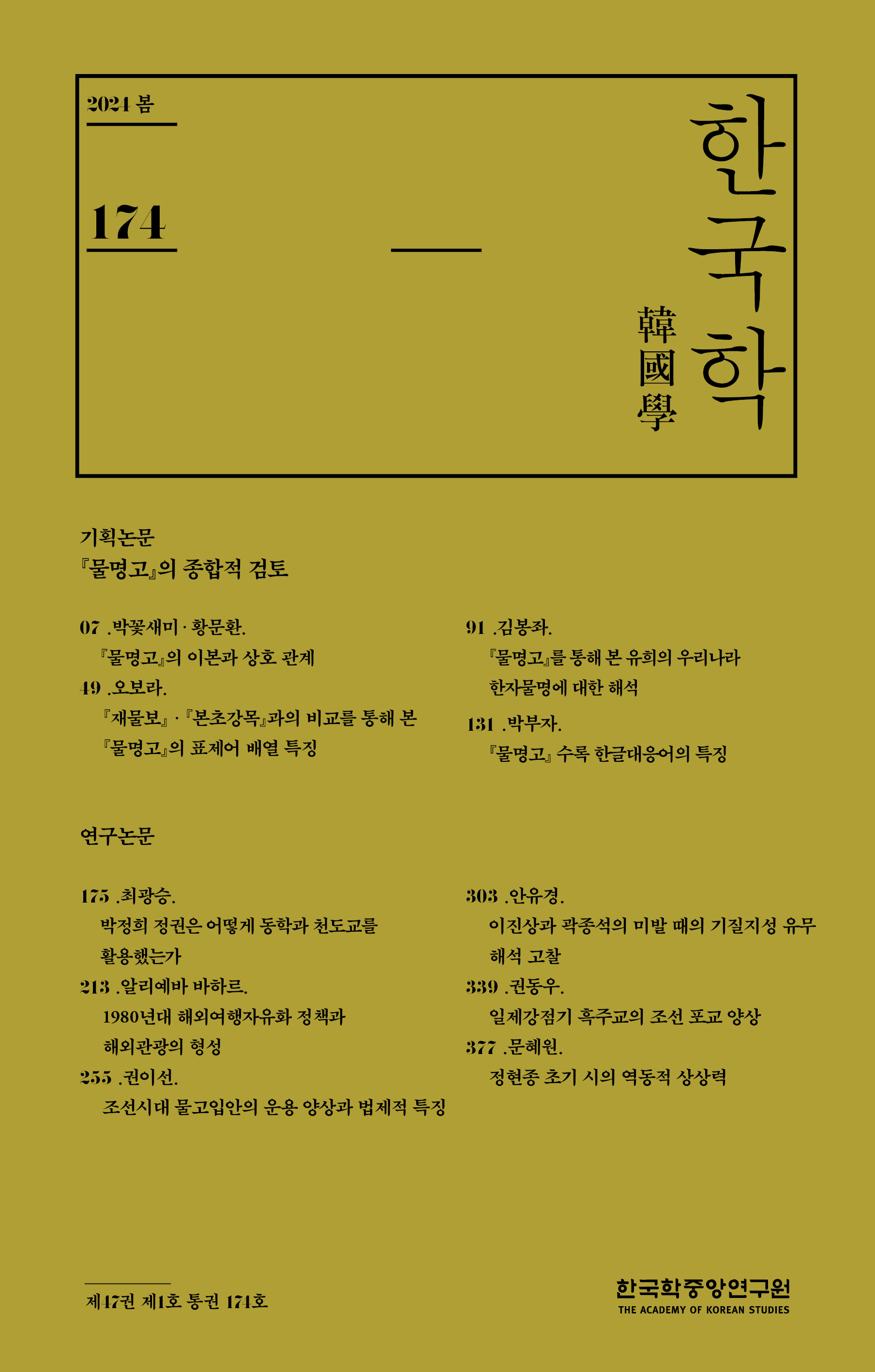
- P-ISSN 2671-8197
- E-ISSN 2733-936X
이한직은 식민지 시대, 친일 관료의 아들로 태어나 일본어로 된 제도 교육을 받았다. 그러나 그는 조선어로 시를 써서 일제 말기 조선어 문학의 보루 역할을 한 ≪문장≫에 발표하였다. 그에게 일본어란, 아버지로 상징되는 식민현실, 외부 세계, 일제의 통치 논리를 뜻하고 조선어는 어머니로 상징되는 조선 땅, 내면세계, 현실에 대한 부정정신을 뜻하였다. 이한직은 조선어로 시를 씀으로써, 친일 관료인 아버지가 만든 온실 속에서 생활하며 내면으로는 또 다른 세상을 꿈꾸는 자신에 대한 비판적 인식을 드러냈다. 해방 후 이한직은 아버지 이진호의 죽음을 계기로, 자아의 좁은 틀에서 벗어나 근대적 주체로 성장하기 시작한다. 내면에 칩거하던 나약한 자아가 해방 이후에는 현실의 불모성에 쉽게 타협하지 않는 근대적 주체로 변화하였다. 이한직은 조상과 가계와 식민지 현실을 비판하기 위해, 생명을 시들게 하는 전쟁 후의 현실을 비판하기 위해, 부정의지를 바탕으로 시를 써 왔다. 그의 시에서 깊은 고뇌와 반성과 좌절이 침전되어 있는 것을 느낄 수 있고, ‘서정’을 가능케 하고 ‘시인’이 존재할 수 있는 현실을 꿈꾸었던 그의 간절한 바람을 읽을 수 있는 것은 이 때문이다.
Lee, Hanjik was born in a pro-Japanese official and educated in Japanese in colonial days. He wrote a poem in Korean and published it in Moonjang which played a key role of Korean Literature in the last colonial period. For him, Japanese means Father symbolizing the realities of colonial days, the outside world and Japanese ruling logic. Korean , by contrast, means for him Mother standing for the land of Joseon, the inner world and the sprit against the reality. Lee, Hanjik displayed criticism against his life protected with too much his father's care dreaming of another world of the mind. After liberation, his father's death led Lee, Hanjik to beginning to develop into the modernized subject freeing himself from narrow self-consciousness. That is his weak narrow self-consciousness living in seclusion changed into the modernized subject taking an unyielding stand on the barren realities after liberation. Lee, Hanjik wrote poems under the negative spirit against the realities in order to criticize for the post-war realities withering up life as well as for ancestors, his family line and the realities of colonial days. We can feel his deep distress, reflection, and frustration precipitated in his poems. From this, we can read his earnest wishes that lyricism and poets could exist in the realities.
(1939) 문장, 문장사
강영미, (2005) 이한직론: 현실인식의 변화과정을 중심으로, 민족문화연구
권성희, (2004) 이한직 시 연구,
김경수, (2003) 격변기 정체성 탐구의 시적 여정: 이한직론, 시학과 언어학
김용직, (1995) <문장>과 문장파의 의식 성향 고찰, 서울대 국교과
김우창, (1977) 서정적 모더니즘의 경과, 민음사
김이상, (1982) <문장>지의 시 연구(1), 한국어문교육학회
김춘수, (1977) 황해, 또는 마드리드의 창부, 한국문학
레온 에델, (1983) 작가론, 삼영사
신경림, (1996) 청춘과 허무의 시인 이한직, 우리교육
이명찬, (1999) 1940년 전후의 시 정신, 한성대한국어문학부
이명화, (1993) 이진호: 일제 식민통치에 앞장선 친일관료의 전형, 돌베개
이봉범, (2007) 잡지 『문장』의 성격과 위상, 반교어문연구
이숭원, (1980) <문장>지에 나타난 고향의식 시고, 한국어교육학회
이한직, (1979) 李漢稷詩集, 昭森社
이한직, (1976) 李漢稷詩集, 文理社
이형기, (1986) 이한직 연구, 부산산업대
이형기, (1986) 이한직론: 어느 귀족주의자의 자각적 파멸, 월간문학
이혜영, (1997) 한국 근대 학교교육 100년사 연구(Ⅱ): 일제 시대의 학교 교육, 한국교육개발원